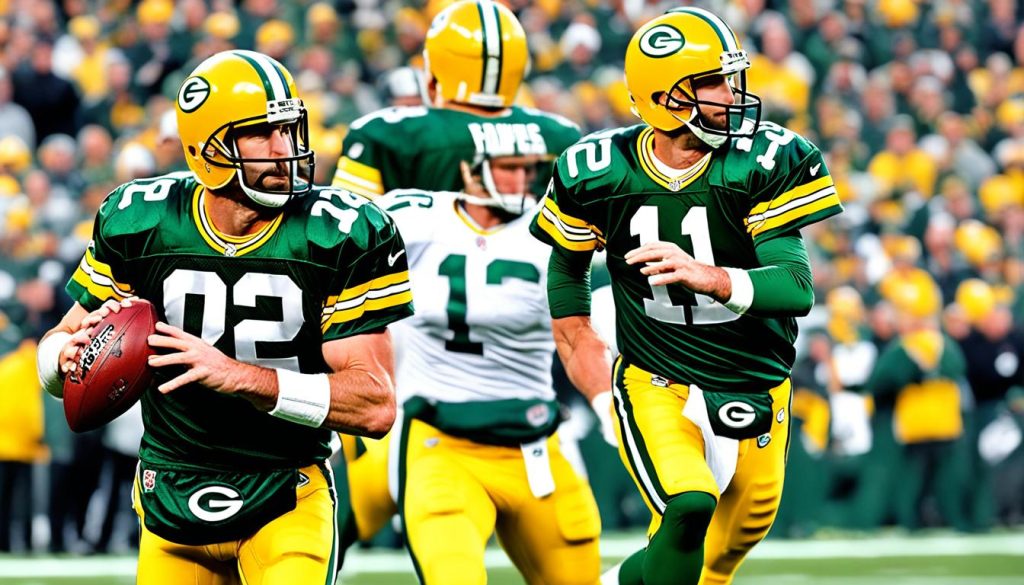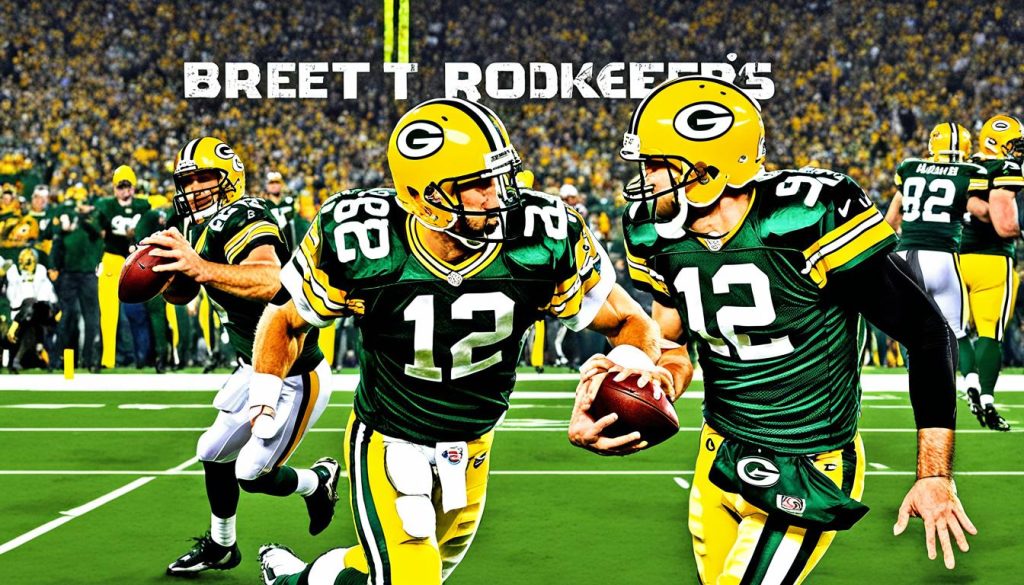Brett Favre vs. Aaron Rodgers: Who Was the Greatest Packers Quarterback?
When examining the era from 1992 to 2022, astonishing statistics reveal the legendary tenure of two of the NFL’s greatest quarterbacks, Brett Favre and Aaron Rodgers. Connected by a shared link to the green and gold of the Green Bay Packers, their reputations and performances have created a heated quarterback rivalry that resonates beyond the shores of Lake Michigan. Both Super Bowl champions, with career statistics that would make even the greatest players pale by comparison, their legacy has moved well beyond the individual and deeply interweaved itself into the fabric of this historic franchise. It thus begs the question – who was truly the greatest quarterback of the Green Bay Packers?
Key Takeaways
- Brett Favre led the Green Bay Packers from 1992 to 2007, while Aaron Rodgers took over from 2008 to 2022.
- Both Favre and Rodgers had impressive win percentages with the Packers – Favre’s being .629, and Rodgers’ .636.
- Favre led the team to seven division titles, four NFC title game appearances, and a Super Bowl XXXI victory. Rodgers, meanwhile, got the team to eight division titles, five NFC title game appearances, and a Super Bowl XLV triumph.
- The comparison between these legendary quarterbacks is not limited to their on-field performances but also extends to their leadership skills and impact on their teams.
- Both players have significantly contributed to the legacy of the Green Bay Packers.
Introduction: A Tale of Two Quarterback Legends
In the realm of the National Football League, few debates generate as much discussion as the comparison between two of the greatest quarterbacks to ever grace the Lambeau Field, Brett Favre and Aaron Rodgers. Each of these prominent athletes not only delivered exceptional performances on the gridiron but also left an indelible mark on the Packers quarterback legacy.
Brett Favre, hailing from the Gulf South, embellished the Green Bay’s football history from 1992 to 2007. His untiring grit, endurance, and playing style made him a stalwart in the world of American football. Favre’s contributions to the team include a Super Bowl victory, three NFL MVP titles, and an all-time passing record for the Packers, changing the course of the franchise’s future.
On the other hand, you have Aaron Rodgers’ era, beginning in 2008 and ending in 2022. Esteemed for his precision and productivity, Rodgers further amplified the tale of Packers success. Besides leading the team to a Super Bowl glory, he earned four NFL MVP awards and delivered some of the most memorable plays in Packers’ chronicles.
The quarterback comparison between Favre and Rodgers transcends mere statistics; it moves into assessing dynamic offensive partnerships that amplified the performance of these NFL icons. Players like Sterling Sharpe, with Favre, and Jordy Nelson, with Rodgers, were instrumental in creating numerous triumphant moments for Packers fans. Such moments have significantly contributed to cementing the Packers as an iconic force in the NFL.
As we delve into their illustrious careers, this comparison brings to life a mesmerizing saga of resilience, skill, leadership, and sheer talent that continues to mold the narrative of one of NFL’s most successful franchises.
The Beginnings: Brett Favre and Aaron Rodgers’ Entry into the NFL

The initial career landmarks of Brett Favre and Aaron Rodgers in the NFL exhibit two distinct yet intertwined journeys. Both players embarked on their gridiron journeys under unique circumstances, illustrating the varying paths of Green Bay’s quarterback transitions.
Favre, initially chosen by the Atlanta Falcons, was swiftly traded to the Packers to kick start his illustrious career, a move that remains one of the most impactful decisions in the franchise history. Rodgers, on the other hand, was a first-round pick for the Packers and spent his starting years under the tutelage of Favre before stepping into the starting role.
| Quarterback | NFL Entry | Rookie Team | Transition to Packers | Start as Packer’s QB |
|---|---|---|---|---|
| Brett Favre | 1991 NFL Draft | Atlanta Falcons | Trade to Packers in 1992 | 1992 |
| Aaron Rodgers | 2005 NFL Draft | Green Bay Packers | – | 2008 |
Irrespective of their beginnings – whether it was Favre’s raw talent shining through a trade to the Packers or Rodgers’ shaping up as field marshal post his draft selection, these two franchise quarterbacks have undeniably marked their significant impact on the illustrious history of the Packers and on the NFL at large.
Brett Favre vs. Aaron Rodgers: Analyzing Career Stats and Achievements
In this comparative evaluation of Favre and Rodgers, our criteria will encompass NFL career stats, regular season achievements, postseason records and various accolades. The essence of their greatness lies not just in the innumerable Packers records they shattered, but also in each quarterback milestone that cemented their legacies. Ultimately, these stats will illuminate their individual dominance and their shared capacity to drive the esteemed Packers franchise to substantial victories.

Regular Season Dominance: Win-Loss Records and Passing Milestones
Throughout their time with the Packers, Favre and Rodgers have both posted extraordinary stats. Favre, who was known for his brute strength and gunslinger attitude, compiled a 160-93 win-loss record. In contrast, Rodgers’ strategic and precision-based approach to the game led to a 147-75-1 record. Favre completed 5,377 passes for 61,655 yards scoring 442 touchdowns during his tenure in Green Bay. Rodgers notches slightly behind with 5,001 completed passes for 59,055 yards with 475 touchdowns.
Regular Season Performance
| Brett Favre | Aaron Rodgers | |
|---|---|---|
| Completed Passes | 5,377 | 5,001 |
| Passing Yards | 61,655 | 59,055 |
| Touchdowns | 442 | 475 |
| Win-Loss Record | 160-93 | 147-75-1 |
Postseason Prowess: Super Bowl Appearances and Playoff Performances
Turning to the postseason, it is clear that both quarterbacks had their prime moments. Each steered the Packers to a Super Bowl victory, with Favre claiming Super Bowl XXXI and Rodgers triumphing in Super Bowl XLV. Favre, reflecting his regular season resilience, stands at a 12-10 playoff record, while Rodgers matches this intensity with an 11-10 record.
Accolades and Recognition: MVP Awards, Pro Bowls, and All-Pro Selections
Over their careers, Favre and Rodgers have acquired substantial professional recognition. Favre secured three NFL MVP awards, made nine Pro Bowl selections, and earned six All-Pro distinctions during his Green Bay service. Rodgers has notched four NFL MVP awards, has ten Pro Bowl nods, and five All-Pro selections to his name. The enduring NFL careers of these All-Pro quarterbacks are marked by these accolades and highlight their status as two of the greatest Packers in history.
Supporting Cast and Team Dynamics
When assessing the legacy of Brett Favre and Aaron Rodgers, the supporting cast’s role is crucial. Both quarterbacks were surrounded by a talented roster, and their success was undoubtedly influenced by these team dynamics, stretching the depth and breadth of the Green Bay Packers’ offensive talent.
In Favre’s era, he had exceptional players like Ahman Green and Antonio Freeman to lean on, both of whom excelled in their roles. The fullbacks and wide receivers of Favre’s era – including William Henderson and Sterling Sharpe – dominated their positions. However, the NFL rosters of the Packers during Rodgers’ time brought in their own brand of excellence. With the likes of Jordy Nelson and David Bakhtiari providing support, Rodgers thrived amidst a superior offensive line, including Bakhtiari and T.J. Lang, who solidified the blocking front.
Moreover, the defensive squads of both eras cannot be overlooked. Favre’s teams included players like Reggie White and LeRoy Butler, stalwarts in their positions. Conversely, Rodgers’ teams featured players like Charles Woodson and Clay Matthews, building a robust defense. The quality of their teammates and the dynamics within the team significantly influenced the quarterback’s success. Given these factors, the debate over whether Favre or Rodgers had a better supporting cast becomes more complex yet forms a critical aspect in evaluating these two quarterbacks’ success factors.
